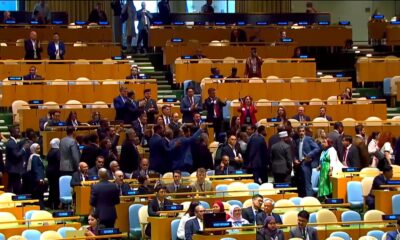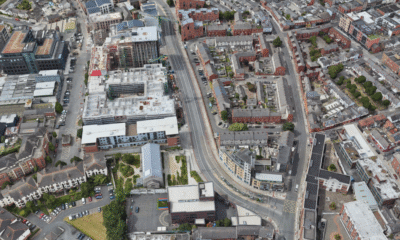Breaking News
What is a digital ID card, will it be mandatory and will it be safe?

Read more on post .
Digital ID will be rolled out across the UK as part of the government’s attempts to tackle illegal working.
But how will it work? Will everyone be legally required to have it? What if you don’t have a smartphone? How does it work in other countries?
We answer all those questions, and more.
Politics latest: Starmer says UK at ‘crossroads’
What details will be on the ID cards?
They will include name, date of birth, a photo, nationality and residency status. A consultation will determine if addresses will be included.
Will digital ID be mandatory?
Yes. All UK citizens will have to have a digital ID, Culture Secretary Lisa Nandy told Sky News.
However, she said it is “entirely their choice” if people want to use them.
The government said people will not be required to carry their ID – although it will be in phones, so people likely will – and they will not be asked to produce it.
The current method of providing a physical driving licence, passport, national insurance, bank statements and utility bills to prove your identity will still be available to use.
How will digital ID be stored and how will you show it?
Earlier this year, the government announced it would launch a gov.uk wallet as part of the gov.uk app launched this summer.
This will look like the ‘wallets’ people can access on their smartphones, such as Apple Wallet and Google Wallet, where contactless bank cards, tickets and loyalty cards are stored and can be used from.
A person’s ID ‘card’ will be stored in the digital wallet, alongside a digital driver’s licence and an Armed Forces Veteran Card, which will launch later this year.
Only government documents will be able to be stored in the gov.uk wallet, and they will not be available through other ‘wallets’.
People will be able to digitally pull up the cards on their phone to display them.
What if you don’t have a smartphone, or don’t want to store ID on your phone?
The government has said people who do not operate digitally, or want to carry a digital ID, will be given a physical card, which will be free.
Read more: The pros and cons of digital IDs – and do we need them?
What will you be able to use digital ID for?
Anything requiring an identity check, ranging from buying alcohol to applying for government services such as driving licences, childcare and welfare.
How will it change employment checks?
For people who are not British citizens, it will be mandatory to show their digital ID to potential employers so they can see their immigration status.
The government said this is the main reason for introducing digital ID as they try to stop one of the key “pull factors” for people to come to the UK illegally.
British citizens will be able to show the digital ID, or their passports, to employers to prove their right to work, a check introduced in 1996.
When will it be rolled out?
The government said digital ID will be available by the end of this parliament, which is set for 2029.
A consultation will first take place to determine how it would work for groups who may not use phones or have difficulty doing so, including older people, homeless people and those with disabilities.
How about cybersecurity concerns?
The government said it will use “state-of-the-art” encryption and authentication technology it already uses to protect digital transactions.
If a phone is stolen or lost, the digital credentials on it can be revoked and reissued straight away.
Ministers said they expect this to provide better security than traditional physical documents.
Will MPs and Lords have to pass legislation?
It seems not.
Culture Secretary Lisa Nandy suggested it would not have to go through the House of Commons or House of Lords and will be pushed through by the government.
When asked if it would have to go before parliament or would just take place, Ms Nandy said: “This is being done.”
Breaking News
Watch: Officials walk out as Netanyahu addresses UN
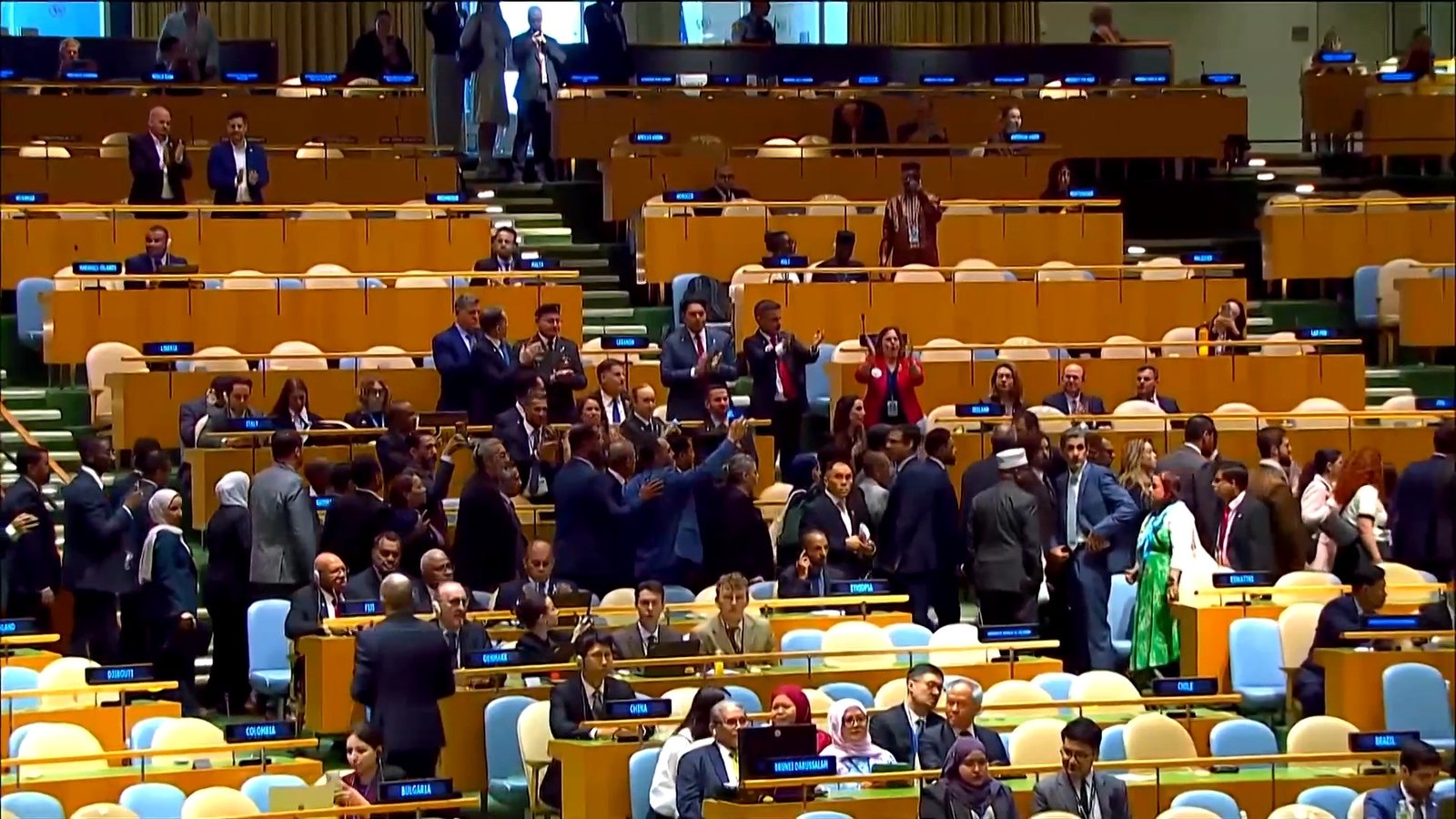
Read more on post.
Scores of delegates exited the hall of the United Nations General Assembly as Israeli Prime Minister Benjamin Netanyahu walked up to the podium to give his speech.
Israel’s military response has killed more than 65,000 people in Gaza, according to local health officials, and left much of the territory in ruins.
In an upsurge of diplomacy, there is renewed pressure to end the almost two-year war in Gaza.
This week, in an effort to put pressure on Israel to end the war, ten countries formally recognised the state of Palestine.
Breaking News
Number recorded homeless rises to more than 16,350
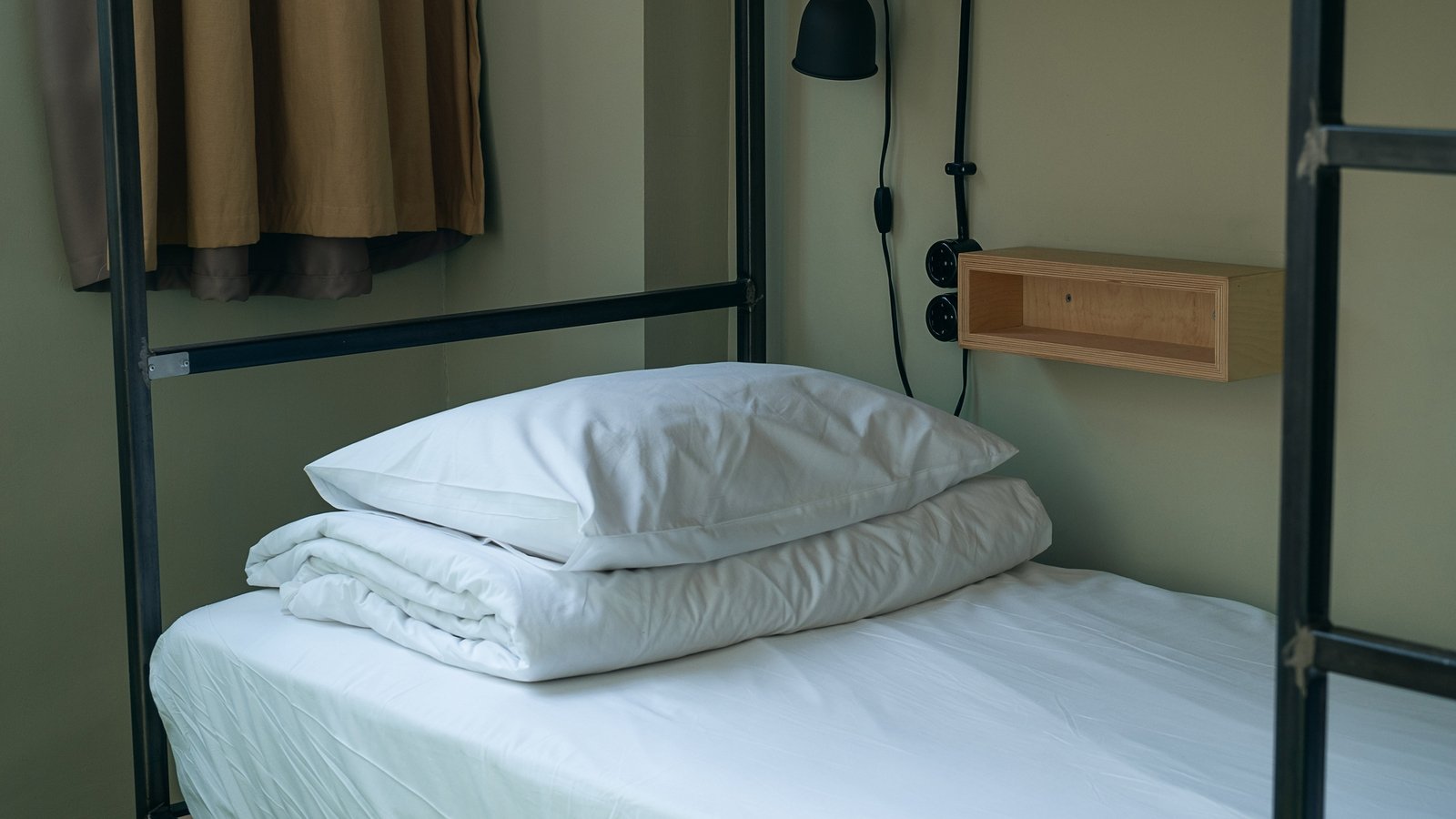
This post was originally published on this site.
A total of 16,353 people in the State have been recorded as homeless, according to the latest figures from the Department of Housing.
Figures for August show the number of people in emergency accommodation increased by 295 from the previous month, with 131 of them children.
The figures mean there has been an increase of 1,867 people (12.9%) in emergency accommodation in a year.
A total of 2,391 were families, marking a 13.9% (292) increase in one year.
The number of homeless children has risen by 16.4%, or 726, in that time.
A total of 5,145 children are living in emergency accommodation.
There are now a total of 1,950 people aged 18-24 in emergency accommodation, which is up 12% in a year and 252 were over 65, marking a 12.5% increase.
The Simon Communities of Ireland said that foundations must be laid in Budget 2026.
Chief Executive Ber Grogan has said that if the Government cares and is serious about reducing homelessness, then housing and outcome-driven investment must form a central plank of Budget 2026.
Focus Ireland CEO Pat Dennigan said that to deal with homelessness housing needs to be provided but so too does support to get people out of homelessness. Both go hand in hand.
CEO of the older people’s advocacy group Alone Seán Moynihan called on the Government to ensure 25% of the houses it builds are reserved for older people.
Speaking on RTÉ’s News at One, Mr Moynihan said housing was the third highest issue for Alone last year.
We need your consent to load this rte-player contentWe use rte-player to manage extra content that can set cookies on your device and collect data about your activity. Please review their details and accept them to load the content.Manage Preferences
“What people may not realise is that the number of over 65s renting has gone up 83% in the last Census and that, in some ways, is the thin end of the wedge because we know behind that more and more people are retiring into old age, into private rented [accommodation].
“Ultimately, there’s a bigger wedge behind that of people in their 40s and 50s that are heading in this direction,” Mr Moynihan said.
He added: “The Government has plans in the Programme for Government to build 330,000 houses and we’re going to like the stats show that 25% of that needs to go to older people.
“With an ageing population, a smaller family size you need to be building an awful lot more smaller houses around the country so people can buy and afford in earlier life.”
Rise in homelessness result of ‘failing housing plan’ – SF
Sinn Féin’s Eoin Ó Broin said the “relentless month on month rise in levels of homelessness” is a result of the Government’s “failing housing plan”.
“It is not their number one priority despite what they are saying,” he said.
He called on Minister for Housing James Browne to include emergency measures in his housing plan and said tax breaks for developers will fail if they are introduced in Budget 2026.
Mr Ó Broin said these measures would include a temporary ban on no-fault evictions, increasing funding for tenant in situ, a greater allocation of existing local authorities’ stock to people experiencing homelessness and the use of emergency procurement and planning powers.
He said the minister also needs to double his social and affordable housing targets.
Mr Ó Broin said Mr Browne is “directly responsible” for the increases in homelessness.
“Unless there is radical changes in his revised housing plan, this crisis is going to continue to deepen,” Mr Ó Broin said.
Breaking News
‘Smirking’ men jailed for life over double murder
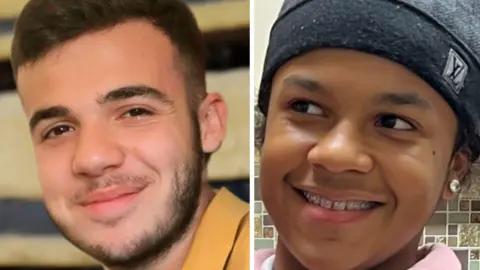
Read more on post.
“Smirking” killers who ran amok at a music video shoot, fatally stabbing two young people and severely injuring a third, have been handed life sentences.
Leonardo Reid, 15, and Klevi Shekaj, 23, were killed and 28-year-old Abdullah Abdullahi was badly hurt when a group of men armed with machetes ambushed the event in Archway, north London, on the night of 29 June 2023.
Lorik Lupqi, 22, and Jason Furtado, 28, had planned the attack and enlisted Abel Chunda, 29, Xavier Poponne, 22, and Eden Clark, 31, to help carry it out.
On Friday, they were handed two life sentences for the murders and 25 years in jail for attempted murder, having been found guilty after a long-running trial.
At the Old Bailey, Judge Anjua Dhir KC told Lupqi he would spend at least 39 years in prison for the “planned, brutal, murderous group attack”.
Furtado and Poponne received minimum terms of 37 years and Chunda and and Clark were given minimum terms of 38 years.
Lupqi, the instigator of the violence, lashed out in the dock and was verbally abusive towards Judge Dhir.
Judge Dhir told the defendants: “With the exception of Xavier Poponne, your behaviour during this trial has been appalling with constant outbursts in court, fights in the dock, disruptive behaviour in the cells in this building and difficult behaviour coming to and leaving this court.”
She said Lupqi had been “by far the worst”, adding that the defendants had shown “a complete lack of respect for the court process and the families of your victims”.
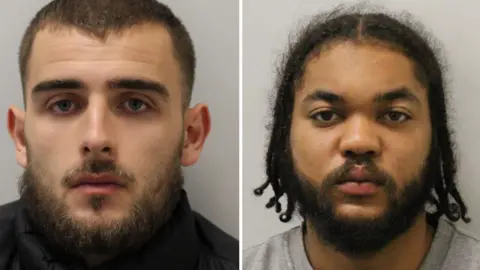 Metropolitan Police
Metropolitan Police“However, I am sentencing you for offences and not for your conduct in court,” the judge said.
As Lupqi was being sent down in handcuffs, he swore and told Judge Dhir: “When I come out I’m going to kill you.”
All but Poponne had previous convictions, with a combined total of 201 offences, including for drugs and possession of weapons. Chunda alone had 97 convictions.
Earlier, the murder victims’ mothers had criticised the defendants for their lack of remorse, “smirking” during their trial and treating it like a “game”.
‘Played with our pain’
Leonardo’s mother, Valentina Locci, said: “My past, present and future has been crushed and taken, not only from me but my family, his siblings and all of our loved ones and friends, and for what?
“An adrenalin rush, an ego boost, a full sense of worth, a selfish gratification with no rewards, at cost to others. What I lost, what we have lost, cannot be found nor replaced.”
Mr Shekaj’s mother, Valbona Shekaj, said in her statement: “Instead of showing remorse or asking for forgiveness, they smirked at us from the defendant’s box.
“They played with our pain, and treated this entire trial as a game, as if the life they took and the devastation they caused meant nothing.”
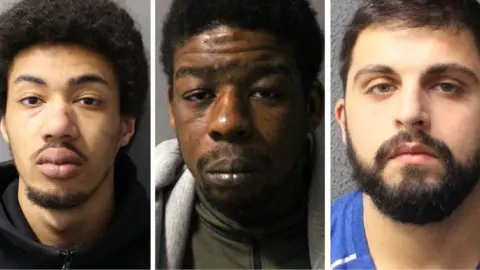 Metropolitan Police
Metropolitan PoliceThe trial had heard how violence erupted after a large group gathered on the Elthorne Estate to record a music video for an artist called Tight Road Baby.
Lupqi had heard that members of a rival gang might be there and called for the attack with the help of Furtado who enlisted Chunda, Clark and Poponne.
Lupqi booked a taxi to pick up the three men from near where Furtado lived in Canonbury, north London.
They wore masks and were armed with machetes as they travelled to the Elthorne Estate where they met Lupqi.
Leonardo and his brother had been watching the music video being filmed with friends.
They scattered after one of their number spotted a black-clad figure wearing a balaclava crouching down and moving towards them with a large knife.
Leonardo’s brother looped back later and saw someone lying motionless on the ground. It was only then he realised it was his brother.
Leonardo had been stabbed in the chest, the wound cutting through his left lung and one of the major blood vessels in his body, causing fatal blood loss.
Mr Shekaj was stabbed in the back, with the wound cutting through his left lung and deep into his body. He died on arrival at hospital.
‘Got me a trio’
Mr Abdullahi was chased and struck with a machete twice to the right side of his body, to the head and right knee.
Judge Dhir said he was “terrified” when he came to court to give evidence in the trial.
After the attack, the taxi took Chunda, Poponne, Clark and Lupqi away from the scene to Chunda’s home in Highgate Hill.
Jurors were told of lyrics recovered from Islington resident Poppone’s phones in which he glorified the killings and bragged he “got me a trio”.
Furtado and Lupqi were wearing electronic tags at the time of the attack.
Lupqi, from Archway, cut off his tag and fled to Kosovo, but was extradited back to the UK.
On Friday, Poponne was handed additional concurrent sentences for dealing in class A drugs and carrying knives, offences he admitted.
-
Politics3 days ago
European Parliament snubs Orbán with vote to shield Italian MEP from Hungarian arrest
-
Culture3 weeks ago
Life, loss, fame & family – the IFI Documentary Festival in focus
-
Health4 days ago
EU renews support for WHO’s Universal Health Coverage Partnership
-
Environment7 days ago
Key oceans treaty crosses threshold to come into force
-
Culture2 months ago
Fatal, flashy and indecent – the movies of Adrian Lyne revisited
-
Culture3 days ago
Twilight at 20: the many afterlives of Stephenie Meyer’s vampires
-
Culture1 week ago
Farewell, Sundance – how Robert Redford changed cinema forever
-
Culture3 weeks ago
What is KPop Demon Hunters, and why is everyone talking about it?





